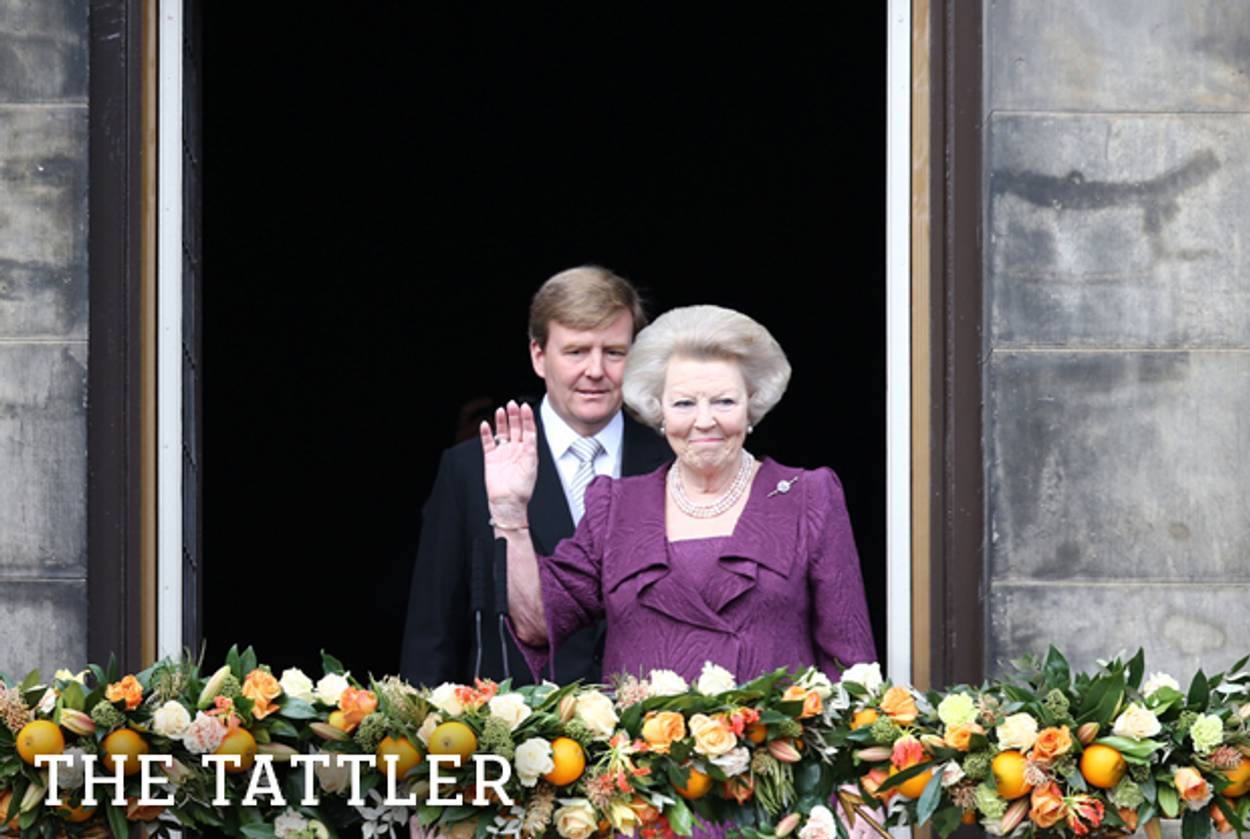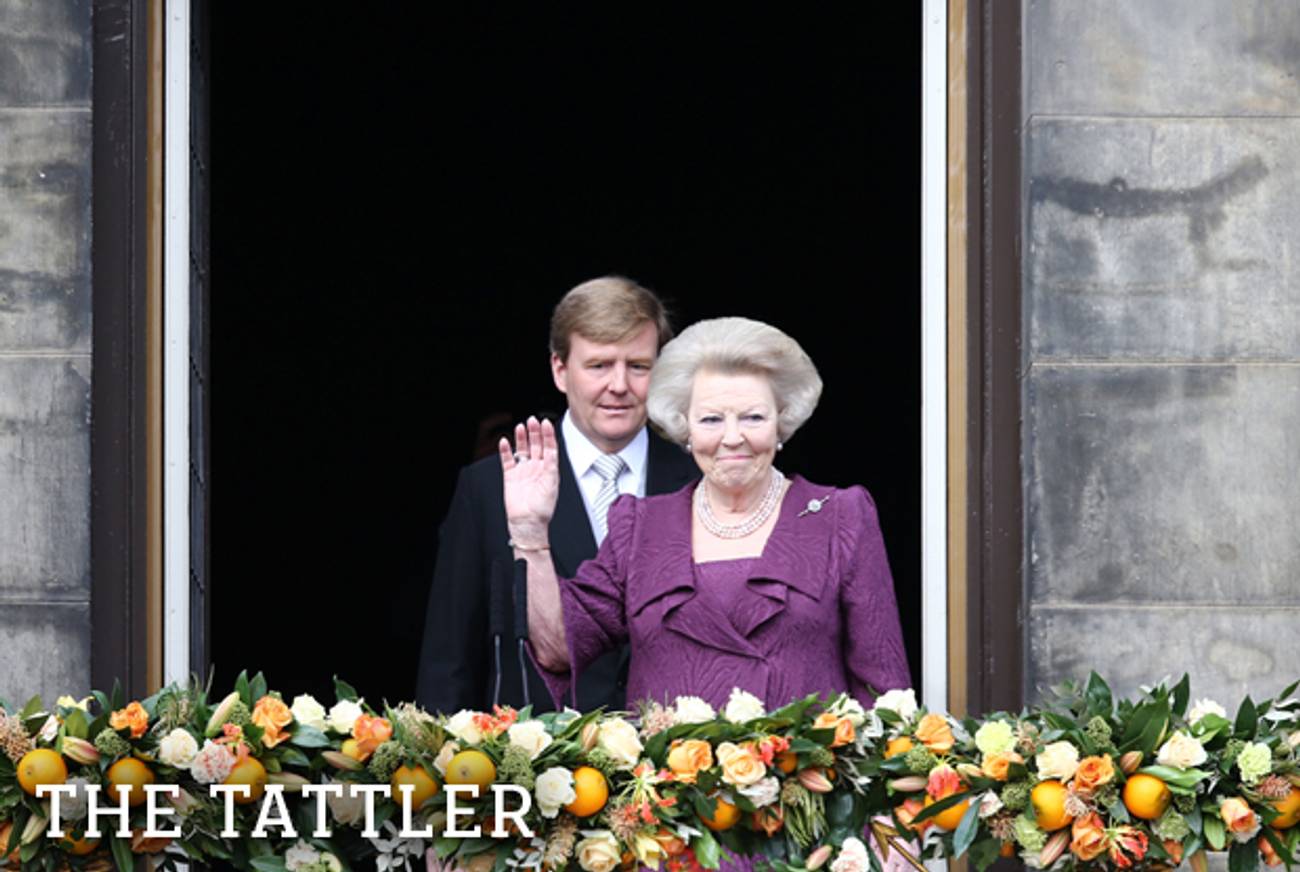The Netherlands’ Jewish Mother
Beatrix abdicated so she could usher in a new era—of heads of state who have never experienced war




The Queen is dead! Long live the King!
That is what they are decidedly not saying in the Netherlands right now, where the former Queen Beatrix, having in accordance with typically practical Dutch tradition abdicated after 33 years on the throne in favor of her oldest son, Willem-Alexander, is still very much alive.
A spry 75-year-old, she was seen all over the place this week in Amsterdam, presiding over a banquet table filled with eccentrically millinered royalty, saucily grinning up a storm at the official abdication ceremony, gazing benevolently over the sea of adoring orange-clad peasantry cheering before the little-used balcony of the royal palace in Dam Square. If the whole experience felt a little like being at her own funeral, it didn’t show in her beaming face or eyes misting over slightly with happy tears. Watching the new king, the first male sovereign of the Netherlands in 123 years, being sworn in, she looked like a kvelling mother watching her son graduate from medical school. We’re all familiar with the concept of the self-sacrificing mother—you can fill in your own joke here. But in this case, Beatrix is doing something more than proving her total, and totally guilty-inducing, devotion to her son. She’s also pushing Europe into a new era.
Unlike this generation of Windsors, or God forbid, the Grimaldis—they of the fatal accidents, the illegitimate children, the captive Princess Charlene, a dead-eyed hostage who seems to inhabit a sort of modern Bluebeard fairy nightmare—the Dutch royal family is famously functional. It’s not that they have been without foibles—Beatrix’s father, the scandal-plagued Prince Bernhard, said by many to have been Ian Fleming’s model for the character of James Bond, was the father of at least two illegitimate children, neither of whom was officially acknowledged until he was comfortably dead. Nor are they untouched by genuine tragedy: A skiing accident last year left Prince Friso, the new king’s younger brother, and father of two young children, in a coma from which he may never recover. Prior to this, Friso had declined to ask the Dutch Parliament to approve his marriage to Mabel Wisse Smit, due to her previous “sailing friendship” with the drug lord Klaas Bruinsma (I was living in Amsterdam when all this was going on, and I can’t say it made a lot of sense to me then either) and has as a result been officially removed from the line of succession.
But Willem-Alexander with his wife Queen Maxima (an Argentinian former investment banker, she famously had no idea “Alex” was a prince when they met) appear to be the very picture of stability. In their civilian clothes, free of the medals, sashes, and tiaras, they look like any other affluent forty-something couple you might see strolling down Madison Avenue on a Sunday afternoon, complete with three adorable blonde daughters in matching tea dresses from some overpriced children’s store. It’s easy to see how Beatrix, after 33 years of service under her belt and probably with some ideas on how better to spend her golden years than opening supermarkets and having her hair criticized by the Daily Mail (she isn’t even their damn queen!) felt more than comfortable vacating the throne to, as she puts it, “make way for a new generation.”
And yet, by that turn of phrase, Beatrix may have meant something more significant than a not-so-subtle hint that someone should get out of the way and just let Kate Middleton—excuse me, the Duchess of Cambridge—be Queen of Everything already. At 46, Willem-Alexander is now the youngest reigning monarch in Europe and one of only two to be born after World War II and the only one to have grown up comfortably out of its shadow. (Carl XVI Gustaf of Sweden was born in 1946.) Given the complicated ties of aristocratic bloodlines, and the fact that the principalities of Germany had for centuries been little more than a so-called “stud farm” for the female scions of more coherent monarchies, the rise of Nazism and subsequent Occupations deeply divided the aristocracy of Europe, often pitting brother against brother in a profoundly literal way. The House of Orange, along with Norway the only surviving royal house of country under Nazi occupation, may have felt this division most keenly. Wilhelmina, Beatrix’s grandmother and Queen-in-Exile, may have been a symbol of national resistance for her people, but her son-in-law Bernhard was a German prince who prior to his marriage to Princess Juliana was a member of the Reiter SS. Beatrix was the first to view Anne Frank’s diary when it went on display; her husband, Prince Claus, however, was a German aristocrat who had been drafted into the Wermacht and joined the Hitler Youth (a membership, to be fair, that was compulsory for all boys of his generation), a fact that even two decades after the end of the war caused an enormous outcry among the still-traumatized Dutch population. Protesters gathered outside the palace chanting “Claus, raus” and “Give me back my bike” (a reference to the German policy of confiscation, which to a cycling-mad people is sort of like some government official showing up at an ammo store in Wyoming to take all the guns). On the day of their wedding, someone tossed a smoke bomb into their carriage. The bride and groom were unhurt, but the message was clear: This wasn’t over. Not by a long shot.
But with the ascendancy of Willem-Alexander, and to paraphrase the book of Exodus, a generation that knew not Hitler, perhaps it finally is. Beatrix’s abdication is the first step in the ushering in of new ceremonial heads of state who have never experienced their continent at war, who may never have a more difficult question to answer than “What did you do in the recession?” By simply being practical, Beatrix has given the crowned heads of Europe a new lease on life. Now let’s just hope her son remembers to call.
***
Like this article? Sign up for our Daily Digest to get Tablet Magazine’s new content in your inbox each morning.
Rachel Shukert, a Tablet Magazine columnist on pop culture, is the author of the memoirs Have You No Shame? and Everything Is Going To Be Great. Starstruck, the first in a series of three novels, is new from Random House. Her Twitter feed is @rachelshukert.
Rachel Shukert is the author of the memoirs Have You No Shame? and Everything Is Going To Be Great,and the novel Starstruck. She is the creator of the Netflix show The Baby-Sitters Club, and a writer on such series as GLOW and Supergirl. Her Twitter feed is @rachelshukert.